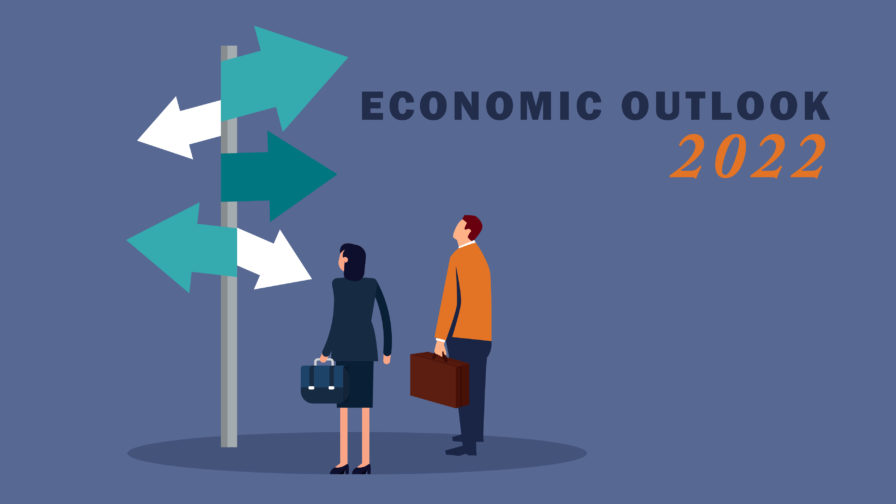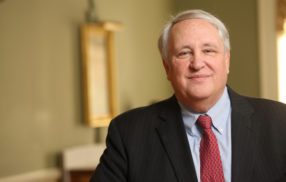
Economic Forecast: What to Expect as Inflation Rises, Pandemic Lingers
By Dave Hendrick
In February 2020, when Darden Professor Alan Beckenstein and lecturer Nick Sargen offered their annual economic forecast, they cautioned that the impact of the coronavirus, which had only just begun to creep into the popular consciousness, remained an unknown factor for the U.S. and global economy.
Almost exactly two years later, the pandemic and its fallout continue to roil and reshape the U.S. economy, which shows signs of both great strength — GDP grew at nearly seven percent at an annualized rate in the fourth quarter of 2021 and unemployment remains low, for instance — and continued friction, perhaps most visibly in the form of a sharp rise in inflation.
The path forward is fraught with uncertainty and volatility, and while few expect a return to the lockdown economy of 2020, the pandemic, and possible future mutations of the coronavirus, remain a concern.
“It’s hard to know what’s going to happen,” said Beckenstein, speaking virtually at a presentation hosted by the Richard A. Mayo Center for Asset Management. “Is the 6.9 percent growth in the fourth quarter a blip or a true sign of strength?”
Among the many key questions, according to Beckenstein, is what happens when the many government interventions intended to blunt the economic impact of the pandemic recede? Equilibrium will have to be achieved “sooner or later,” Beckenstein said, and the effect cannot be accurately predicted.
“The U.S. economy the past two years was influenced by government bailouts and incentives, as well as interference with market behavior,” said Beckenstein. “Sooner or later we have to go back to flexible markets.”
The path to sustainable, long-term growth remains complicated by the dissonance between the two major political parties in the U.S., which have differing views on the economy, its headwinds and potential shocks, said Beckenstein. The Darden economist said he considers the threats from climate change could pose downside risk to the economy in the intermediate to long term. Also, he says the fiscal strategies pursued in recent years have led to an “overheating” of the economy, resulting in rising inflation. Beckenstein added that while equity markets generate the popular attention, a strong market should be a result of a strong economy, and not be confused as equivalent.
Equity Investing Likely ‘Gets Tougher From Here’
The strong economic recovery, even as COVID-19 refused to fully ebb, was one of the top surprises of 2021, said Sargen, with equity markets, too, seeming to shrug off any negative news in a steady march upward through the bulk of 2021.
“When you look at the stock market, the only thing you can say is ‘up, up and away’ said Sargen, noting that major Indices had essentially doubled in value since the early pandemic-related dips of March 2020.
Ever since the onset of government-backed stimulus, the markets have been on a “remarkable run” for seven quarters until the start of 2022, Sargen said.
The start to 2022 has taken some of the wind out of the market’s sails of course, with investors closely watching the Federal Reserve Board for signs of an interest rate raise in the face of significant inflation.
Sargen said the strength and seeming endurance of recent inflation had caught nearly all close observers by surprise, with early predictions that inflation was merely a transitory hiccup related to COVID-impacted supply chain disruption looking increasingly suspect.
With nearly all observers now expecting interest rate increases in the coming months, Sargen said the question for investors is how gradual the rate increases are likely to be. If inflation eases to three percent or so, the Fed will take a gradual approach, Sargen said. If inflation remains at high levels, the Fed will need to move faster.
Either way, investors should have a plan to hedge the risk, Sargen said, noting that many high-flying tech stocks have been particularly vulnerable to recent changes in sentiment.
“We have been living, in the past two years, in a world where the investment strategy is to take the maximum amount of risk you are willing to take,” said Sargen. “Folks, it gets tougher from here. I’m not necessarily a bear, but a lot of the upside is already priced in [the markets].”
The University of Virginia Darden School of Business prepares responsible global leaders through unparalleled transformational learning experiences. Darden’s graduate degree programs (MBA, MSBA and Ph.D.) and Executive Education & Lifelong Learning programs offered by the Darden School Foundation set the stage for a lifetime of career advancement and impact. Darden’s top-ranked faculty, renowned for teaching excellence, inspires and shapes modern business leadership worldwide through research, thought leadership and business publishing. Darden has Grounds in Charlottesville, Virginia, and the Washington, D.C., area and a global community that includes 18,000 alumni in 90 countries. Darden was established in 1955 at the University of Virginia, a top public university founded by Thomas Jefferson in 1819 in Charlottesville, Virginia.
Press Contact
Molly Mitchell
Associate Director of Content Marketing and Social Media
Darden School of Business
University of Virginia
MitchellM@darden.virginia.edu






